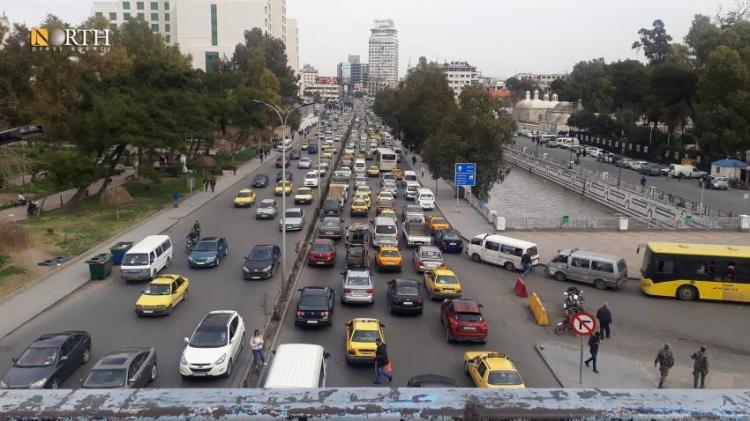QAMISHLI, Syria (North Press)- The Caesar Act team, a group formed by the American Congress to advise the American administration on the application of sanctions against the Syrian government, revealed to North Press that Syrian President Bashar Assad will be forced to accept a political transition in Syria and the impact of the sanctions will be less on the northeastern region of Syria.
No choice for Damascus
Nizar Zakka, a member of the Caesar Act team and director of programs for the United States Institute of Peace, said in a phone call with North Press that “the Syrian government has no choice but to accept a transitional stage in Syria and cannot ignore the Caesar sanctions."
Zakka told North Press that, “The deteriorating economic situation in Iran and the increasing pressure on the border crossings between Syria and Lebanon will increase the impact of sanctions on the government, and this will help reduce support for the Syrian government.”
Officials in Lebanon are afraid that the acts will affect the living conditions in it, especially since there are illegal crossings with Syria controlled by Hezbollah, as Washington sees it hitting Hezbollah in the core.
Zakka, a Lebanese IT expert residing in Washington, was arrested by Iranian authorities during his visit to Iran in 2015 on charges of working for the U.S. He was released in June 2019 at the request of Lebanese officials. He is considered one of the godfathers of Caesar Act, who works with other members of the Caesar team formed by the American Congress. The team includes advisors from countries covered by the Act, whose mission is to prepare lists of the names of people, entities, and companies that support the Syrian government.
New sanctions
On the differences in the sanctions required by the Caesar Act previous US and EU primary sanctions on Syria, Zakka said: “Previous sanctions targeted individuals from the Assad regime’s inner circle, while the current sanctions will target entities providing assistance to the Assad regime’s war efforts, within the military, reconstruction, and energy sectors.
"The sanctions do not include only those who deal with the regime, but everyone who works to support its allies as well. For example, those who provide support to Lebanese Hezbollah or the Iraqi Hashd al-Shaabi (PMU) will be subject to sanctions, and in this way the Act blocks all roads to the Syrian regime," he added.
What about Qamishli?
On the impact of Caesar Act on the economic situation northeast Syria, which is run by the Autonomous Administration and supported by the U.S, he said, "This region will not be affected very much by the sanctions."
"The situation in and around the city of Qamishli will be better, because it gets good quantities of dollars and foreign currencies compared to other Syrian regions, but may be affected a little by the fluctuation of the local currency which has plunged in value,” he added.
On the commercial movement between the government-controlled areas and the autonomous areas, he said, "The sanctions do not include domestic trade in Syria."
He explained that “individuals and companies involved in the trade of food and other goods between Qamishli and Damascus will not be subject to any sanctions.”
Officials in the Autonomous Administration of North and East Syria expressed their concern about the region being affected by American sanctions, as these regions are part of Syrian territory.
Badran Jia Kurd, a Kurdish official, said that “the Autonomous Administration regions will be exempt from the Caesar sanctions, but the mechanisms and means to achieve this exemption are not clear yet.”
“The sanctions would have an impact on this area, which trades with government-held Syria via local merchants and uses the Syrian pound, which has plunged in value,” Jia Kurd added.
Deputy Special Envoy to the Global Coalition to defeat ISIS, William Roebuck, told North Press that "the sanctions will not target the regions of North and East Syria or the Syrian people, but will only target the Syrian regime.”
Observers of the economic issue believe that the sanctions will cover the entire Syrian territory, while Washington will not be able to exempt the areas which aren’t held by the Syrian government, in contrast to the American statements.
Civilians are exempt
Zakka told North Press that “the law will not impose sanctions against the Syrian people; on the contrary, it is in the interest of Syrians and came as a step to protect them from the Syrian government and its security services. The Act will not target ordinary Syrian people."
He added that “the Syrian government has no direct support from Syrian people, so the sanctions do not target them.”
What will the act do?
Regarding the stages of the Caesar Act, Zakka said, “The sanctions will last for ten years and has several stages in terms of punitive regulation.”
He pointed out that the first stage of the sanctions actually started by issuing a small regulation that included supporters of the Syrian government, and this was only a warning to all supporters of the Syrian regime and its allies in Syria.
He continued, "The U.S administration will issue major sanctions regulations in the next stage, in case they do not stop supporting the Syrian regime."
The first phase of Act came into effect on June 17, as approved by the US Senate in December. It included the imposition of sanctions on 39 individuals and entities in Syria that Washington considers responsible for violating human rights, including Syrian President Bashar Assad and his wife Asma Akhras.
The Caesar Act was named after a defector from the Syrian intelligence services, a military photographer codenamed Caesar, who submitted about 55,000 photos documenting the massacres and war crimes committed by Syrian security services against civilians and demonstrators in Syria since 2011.
(reporting by Hogir Abdo, editing by Lucas Chapman)

